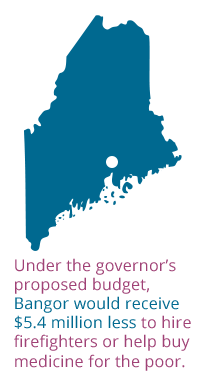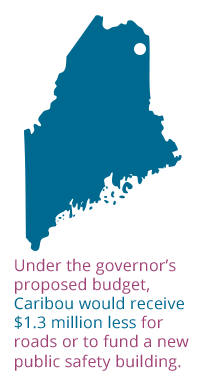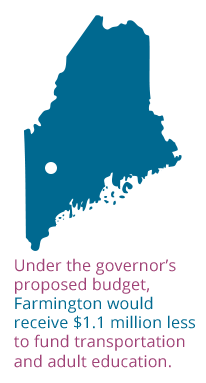Proposed budget falls $160 million short of full funding for local services
This year, the state was scheduled to fully fund critical local services for the first time in more than a decade. That funding would help pay for things that support our economy and make our communities better places to live — services such as public safety, road maintenance, parks, public works, and libraries.
However, Governor Janet Mills’ budget proposes another round of cuts to funding for local services, creating a $160 million shortfall in critical funding that helps communities thrive and reduces pressure on local property taxes.
Using the tool above, you can explore Maine’s communities to see how much additional funding each town and city would receive if the state fully funded its share of the cost of local services, relative to the funding proposed by the governor’s budget plan.
Maine’s towns and cities provide valuable public services that support families and small businesses. To pay for those critical services, the state is supposed to send 5 percent of revenue from the income and sales taxes back to communities. This disbursement, known as Municipal Revenue Sharing, helps cover the cost of the things that make our towns and cities strong and helps limit property tax increases.
Unfortunately, the Legislature has not fully funded Municipal Revenue Sharing for more than a decade. It has used a series of purportedly temporary cuts to plug holes in the state budget and pay for tax cuts that primarily benefited the wealthiest Mainers.
Cuts to Municipal Revenue Sharing have squeezed local communities hard. To make up the shortfall, they have had to increase property taxes, cut services, or both.
The temporary cuts to Municipal Revenue Sharing were scheduled to expire this year, with towns and cities receiving full funding from the state for the first time since 2008. Rather than full funding, the governor’s budget proposal includes a new round of cuts.
Continued shortfalls that put our students, teachers, and communities further behind are not inevitable. This budget cycle lawmakers have a choice: They can continue funding wasteful LePage-era tax cuts that benefit the wealthiest or they can fix our tax code so we can invest that money in things that support thriving communities and a strong economy.
Mainers who want their communities to receive complete state funding for the first time in a decade should reach out to their state legislators. Tell them: Our local services are worth paying for.





